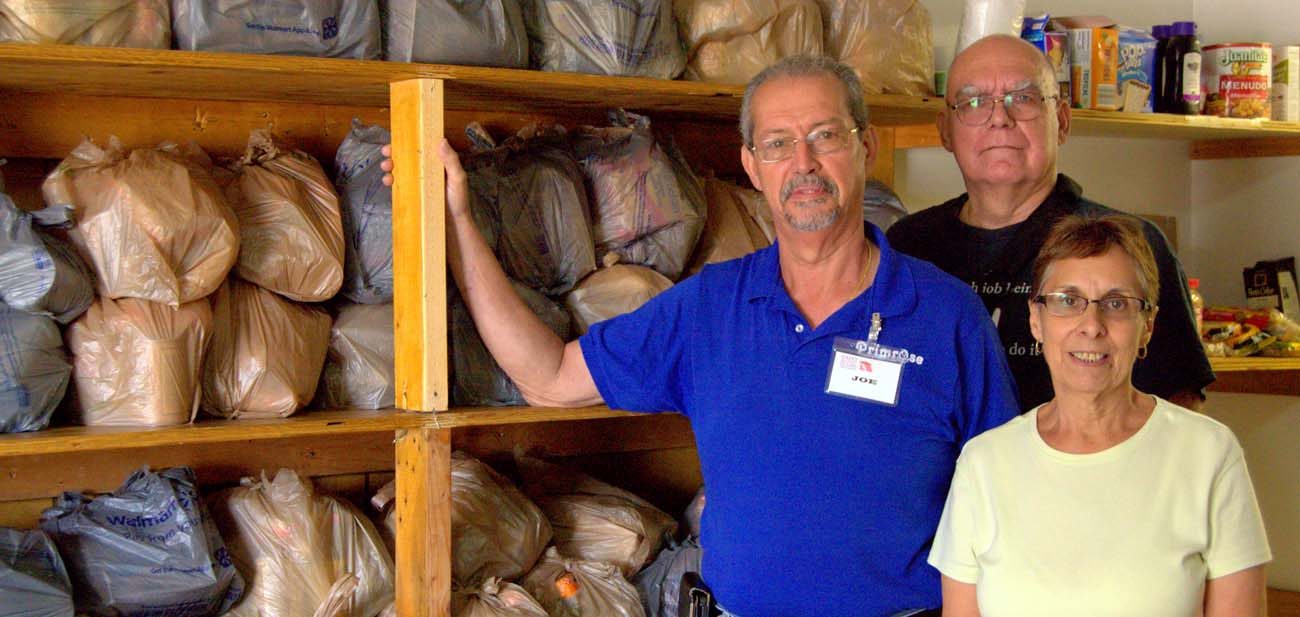KISSIMMEE, Fla. (CNS) — The best way to cope with something like Hurricane Irma: Get ahead of it.
That simple wisdom kept the turnout light at St. Rose of Lima Church Sept. 12, a day after the storm roared through Kissimmee, a town just east of Walt Disney World in the Orlando Diocese.
Only 15 to 20 people showed up for bagged goods at the church, reported Robert Doktor, director of its food pantry. That’s at least partly because of foresight: “About 160 people stocked up Sept. 5, because they knew the storm was coming” before Irma arrived, he said. “Normally, we get 130 people.”
(See a related video.)
Such readiness, of course, is possible only with a long-standing ministry like St. Rose of Lima’s food pantry, which runs out of a 1,700-foot-square house. Each month, the pantry gives out four to six tons of food to more than 500 families, as well as anywhere from six to 40 homeless individuals.
Serving them each Tuesday are 50-60 volunteers, including 18 who worked at the pantry the day after Hurricane Irma passed. Doktor himself showed up despite having right arm in a sling from rotator cuff surgery.
[hotblock]
Those who came said they found it rewarding.
“Someone said ‘God bless you’ and hugged me,” said Joe Rodriguez, one of two assistants at the pantry. “It’s like a big family here.”
Marilyn Perreira, the other assistant, agreed. “This is giving back to the community. I’m retired — why shouldn’t I do something for others?”
And Barbara Guth, a veteran at eight years with the pantry, sounded almost like Pope Francis preaching his theology of encounter. “The people who come in here, they’re wonderful. They hug me and tell me how they’re doing. You think you’re helping them, but they’re helping you,” she told the Florida Catholic, the newspaper of several of the state’s dioceses.
The volunteers have another likely reason for the light turnout Sept. 12: Power was out in much of Kissimmee, and many people may not have known the pantry would be open. Rodriguez said he expected a lot of walk-ins Sept. 19, the next Tuesday pantry volunteers were slated to hand out food.
The impact of Hurricane Irma on Florida brought flooding to Kissimmee, which is in the central part of the state. Hardly any place in the path of the massive storm was left untouched. Its strength and size, with 120-plus-mph winds stretching 70 miles from its core, leveled entire islands in the eastern Caribbean, brought unprecedented flooding on Cuba’s north coast, devastated the Florida Keys, snapped construction cranes in downtown Miami and targeted cities along Florida’s Gulf Coast.
In the Keys alone, at least 25 percent of the homes were destroyed and 65 percent suffered significant damage, according to Federal Emergency Management Agency administrator Brock Long. “Basically, every house in the Keys was impacted,” he told the news media.
In a Sept. 12 statement, the U.S. bishops’ Executive Committee prayed for “the safety and care of human life” after two catastrophic hurricanes — Irma and Harvey — and they urged Catholics around the country to offer their prayers as well as financial support and volunteer help as they can.
In Kissimmee, St. Rose of Lima’s pantry has been serving this half-Anglo, half-Latino community for nine years — perhaps surprisingly, given the manufactured joy of nearby Disney World. But looks can deceive, Doktor said: In the fiscal year ending June 30, the pantry served 420 families per month; now it’s over 500.
[hotblock2]
What’s more, roughly half of the clients are elderly. And in the Poinciana community around St. Rose of Lima, more than one-quarter of the families with children fall below the national poverty level, Doktor said.
“One of the ladies today came in, and she has three grandchildren she’s raising on Social Security,” Doktor said. “We see this all the time. Now you know why I do this.”
Fortunately, the pantry has many allies. It gets donated food from area stores, restaurants and the Second Harvest food bank. Civic, ethnic and community organizations also hold fundraisers for the pantry, Doktor said.
He and other pantry volunteers also are planning and saving for a new center, with equipment like a refrigerated truck. Thus far, they’ve raised $30,000-$40,000 of a $400,000 goal.
***
Davis writes for the Florida Catholic, newspaper of the Archdiocese of Miami and the dioceses of Orlando, Palm Beach and Venice.
PREVIOUS: Bannon remarks on ’60 Minutes’ revive anti-Catholic, anti-immigrant views
NEXT: Carmelite sister cleans up after Irma with a chainsaw, becomes sensation



Share this story